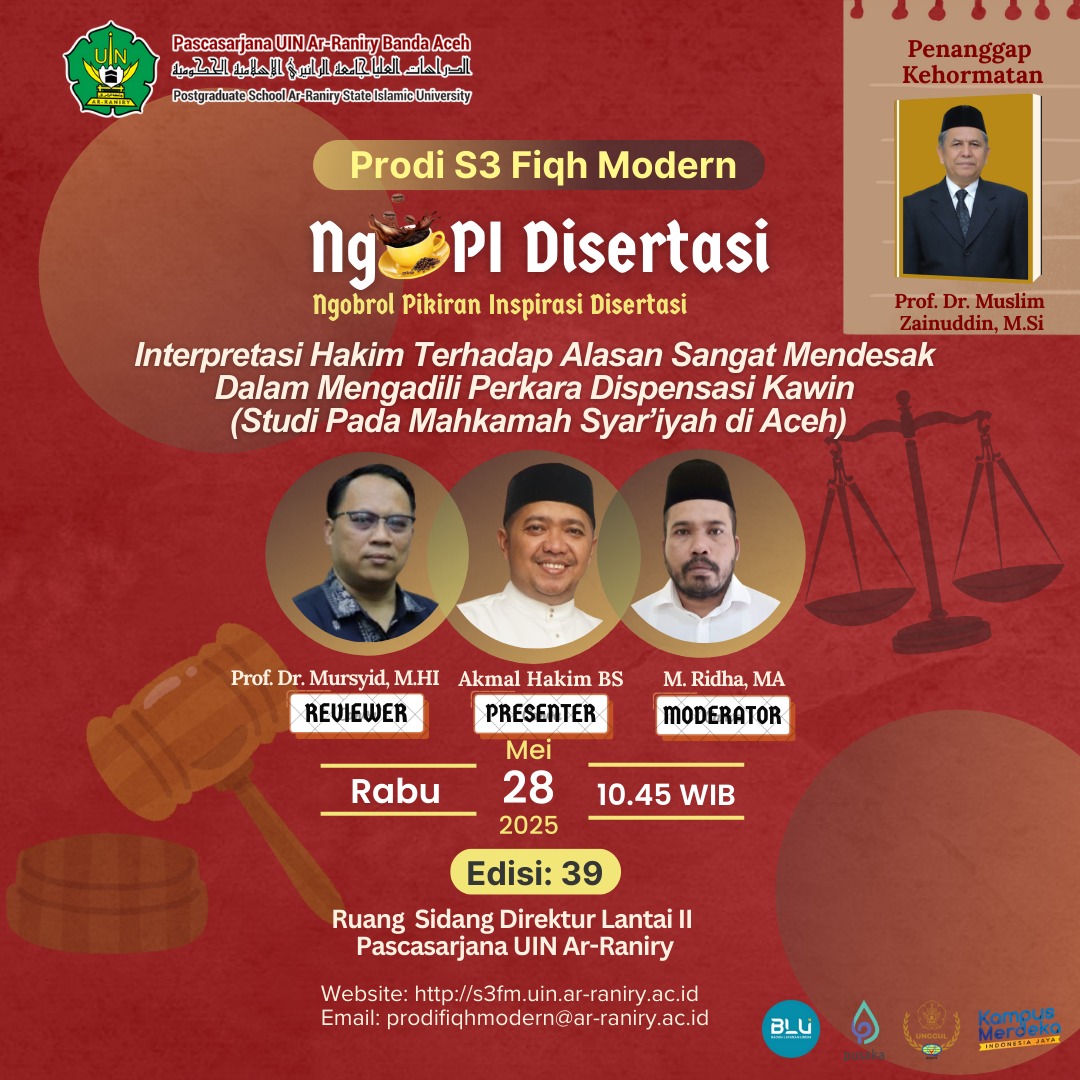
Modern Fiqh [Doctoral]
NgoPI Dissertation Edition 39 with the Theme: Judges' Interpretation of Urgent Reasons in Adjudicating Marriage Dispensation Cases (A Study of the Sharia Court in Aceh)
NgoPI Dissertation 39th Edition
This time, we will discuss one of the important requirements for marriage in Indonesia, as stipulated in Law Number 16 of 2019 concerning Amendments to Law Number 1 of 1974, which stipulates the minimum age of 19 for both men and women. However, social reality shows that many prospective brides and grooms under this age still wish to marry, requiring a marriage dispensation through the judicial process.
Legal provisions do not explicitly stipulate specific reasons or criteria for granting this dispensation request, leaving room for interpretation for judges in considering the legal and social facts in each case.
The absence of a concrete definition or indicator for the term "very urgent reasons" in the Law and Supreme Court Regulation (Perma) Number 5 of 2019 has the potential to create legal uncertainty. This situation creates loopholes for the legalization of child marriage through the judicial process, which in turn can jeopardize the protection of children's rights and the purpose of establishing a minimum marriage age. Judges are expected not only to be mouthpieces of the law, but also to actively explore relevant social facts to balance legal values and substantive justice in handling marriage dispensation cases.
Based on the urgency of this issue, this study aims to analyze the concept and indicators of "urgent reasons" in marriage dispensation cases, specifically within the jurisdiction of the Aceh Sharia Court.
This study is important as a reference for the public in submitting applications and as a basis for judges' considerations in deciding cases. Furthermore, this research is expected to enrich the legal literature regarding legally and sociologically accountable parameters in handling child marriage dispensation.
This research uses a normative and empirical legal approach, examining various provisions of positive law and relevant Islamic jurisprudence principles. The empirical approach is conducted through a study of judicial practices at the Aceh Sharia Court. Thus, this research is expected to comprehensively describe how judges interpret urgent reasons, while also formulating legal indicators that can be used as guidelines by the public and judicial officials in handling marriage dispensation cases in a more accountable and equitable manner.
(SyR)☕
This time, we will discuss one of the important requirements for marriage in Indonesia, as stipulated in Law Number 16 of 2019 concerning Amendments to Law Number 1 of 1974, which stipulates the minimum age of 19 for both men and women. However, social reality shows that many prospective brides and grooms under this age still wish to marry, requiring a marriage dispensation through the judicial process.
Legal provisions do not explicitly stipulate specific reasons or criteria for granting this dispensation request, leaving room for interpretation for judges in considering the legal and social facts in each case.
The absence of a concrete definition or indicator for the term "very urgent reasons" in the Law and Supreme Court Regulation (Perma) Number 5 of 2019 has the potential to create legal uncertainty. This situation creates loopholes for the legalization of child marriage through the judicial process, which in turn can jeopardize the protection of children's rights and the purpose of establishing a minimum marriage age. Judges are expected not only to be mouthpieces of the law, but also to actively explore relevant social facts to balance legal values and substantive justice in handling marriage dispensation cases.
Based on the urgency of this issue, this study aims to analyze the concept and indicators of "urgent reasons" in marriage dispensation cases, specifically within the jurisdiction of the Aceh Sharia Court.
This study is important as a reference for the public in submitting applications and as a basis for judges' considerations in deciding cases. Furthermore, this research is expected to enrich the legal literature regarding legally and sociologically accountable parameters in handling child marriage dispensation.
This research uses a normative and empirical legal approach, examining various provisions of positive law and relevant Islamic jurisprudence principles. The empirical approach is conducted through a study of judicial practices at the Aceh Sharia Court. Thus, this research is expected to comprehensively describe how judges interpret urgent reasons, while also formulating legal indicators that can be used as guidelines by the public and judicial officials in handling marriage dispensation cases in a more accountable and equitable manner.
(SyR)☕